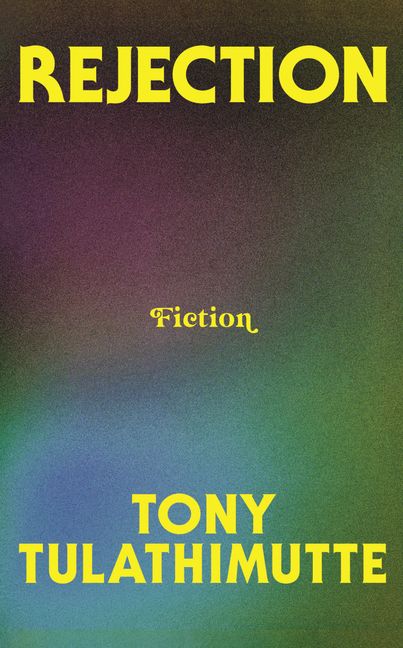
- Free Article: No
- Contents Category: Fiction
- Review Article: Yes
- Article Title: Funny ha ha
- Article Subtitle: Vicious, vigorous fiction
- Online Only: No
- Custom Highlight Text:
An irony of this age, when everyone is connected to everyone else, is that loneliness proliferates. Martin Luther’s claim that a lonely man ‘always deduces one thing from the other and thinks everything to the worst’ is exemplified by the miserable spiralling of fervidly online isolates. This is the world of Tony Tulathimutte’s Rejection.
- Book 1 Title: Rejection
- Book 1 Biblio: Fourth Estate, $36.99 hb, 240 pp
- Book 1 Cover Small (400 x 600):

- Book 1 Cover (800 x 1200):

- Book 1 Readings Link: https://www.readings.com.au/product/9780008759414/rejection--tony-tulathimutte--2025--9780008759414#rac:jokjjzr6ly9m
Tulathimutte charts his terrain in five interlinked long short stories, and two end pieces, the latter of which adds little. The first story, ‘The Feminist’, provoked controversy when it was published in n+1 in 2019. At the time, Tulathimutte tweeted: ‘To be clear in advance: Feminism is good, this character is not good.’ That intervention pre-emptively flattened the story’s artful ambiguities and suggested a lack of faith in his readers. Similar hedging diminishes Rejection, a little.
The first two stories are about romantic rejection, told in the third person. The third is about a gay man, Kant, who is unable to come out as a sadist. The fourth story is told in the first person by an insufferable optimisation bro. By the final story, the protagonist is rejecting the notion of identity itself and then sneering at our credulity about the authenticity of anything written online, or indeed, in this book.
These characters grasp for connection and fail. They are millennials (the generation born 1981-96) inhabiting a text-based world of bulletin boards, blogposts, SMS, and Twitter (before X marked the blot). They also masturbate with gruelling frequency and worrying dedication. One character ‘starts using a penis pump to the point of vascular damage, giving his penis the look of a dead manatee’.
It is fifty-six years since another famous literary emission, from Philip Roth’s Portnoy’s Complaint (1969). That novel’s titular disorder described ‘strongly felt ethical and altruistic impulses perpetually … warring with extreme sexual longings, often of a perverse nature’. Innocent days! Ethical and altruistic impulses are absent from Tulathimutte’s universe, which has the emotional register of a Todd Solondz movie scripted by Breece D’J Pancake.
The saving grace is humour. Rejection is prodigiously, disgracefully funny. White progressives want to be ‘morally dommed’ and say ‘Mmm at the phrase “refugee family” like she’d fed them something delicious’. Tulathimutte lampoons a ‘$900-a-head three-day community fermentation class for BIPOC’ and gleefully delineates subsets of what he calls Crazians (crazy Asians).
Fifteen bravura pages of ludicrous excess are devoted to an ultra-pornographic script written by the character Kant for an OnlyFans hunk to perform. Star of the show is Kant’s member, ‘the hugest, veiniest, purplest slab of thoroughbred cockmeat you have ever seen, about the size of a baguette’, which later grows to a length of sixty feet.
By the end of the script Kant has discovered he can convert carbon into ‘cockmass’, reversing climate change. ‘[T]herefore, keeping me hard is a matter of planetary survival. My individual spermatozoa are so tall and charismatic that they’re elected to lead the G8 nations.’ There is a lot of this sort of thing, and a lot that is more extreme, and it will be off-putting to many readers unless they are fellow habitues of ‘the primordial cumbath the modern troll, edgelord, groyper etc. slithered from, as did I’.
However, the same author offers aphorisms and insights of acuity. He calls identity ‘at its worst, a patriotism of trauma, or a prosthesis of personality’. He says: ‘Discourse is loneliness disguised as war.’ He notices that people ‘are so transparently their child selves online, how irrespective of content or sophistication the subtext is always Look at me and How dare you, and the sub-subtexts Who am I and Save me.’
It shares many concerns – identity, masculinity, masturbation – with another acclaimed recent US novel, The Slip by Lucas Schaefer (2025). Both books are savagely funny, preoccupied with race, the work of socially aware writers eager to skewer the hypocrisies and painfulness of liberals while paying scant attention to the excesses of the political right. Tulathimutte’s book is tougher, wilder, more culturally significant. Schaefer’s will sell more copies.
It gives little away to say that Tulathimutte’s largely unlikable protagonists remain unredeemed. By the end of the second story, ‘Pics’, Alison realises that, ‘whether or not it has been her choice, to be and feel nothing will be all that has made life possible.’
In the author’s words, ‘The protagonists of Rejection each at some point after restlessly shuttling between concealing and revealing, eventually retreat to isolation, their only sure defence.’
This is vicious and vigorous fiction – a corrective to the mushy noodling of so much contemporary literature – so it is a minor disappointment that periodically Tulathimutte loses his nerve and tries to sneak word out that he is not such a bad chap – as per his 2019 tweet. But, as always, the author is five steps ahead. The book concludes with a (presumably mock) publisher’s rejection letter for Rejection that, meta and ouroboric, anticipates this very criticism: ‘This perverse apologizing only feels like you’re cutting and chewing our meat for us, and we reject you (literally) all the harder.’


Comments powered by CComment